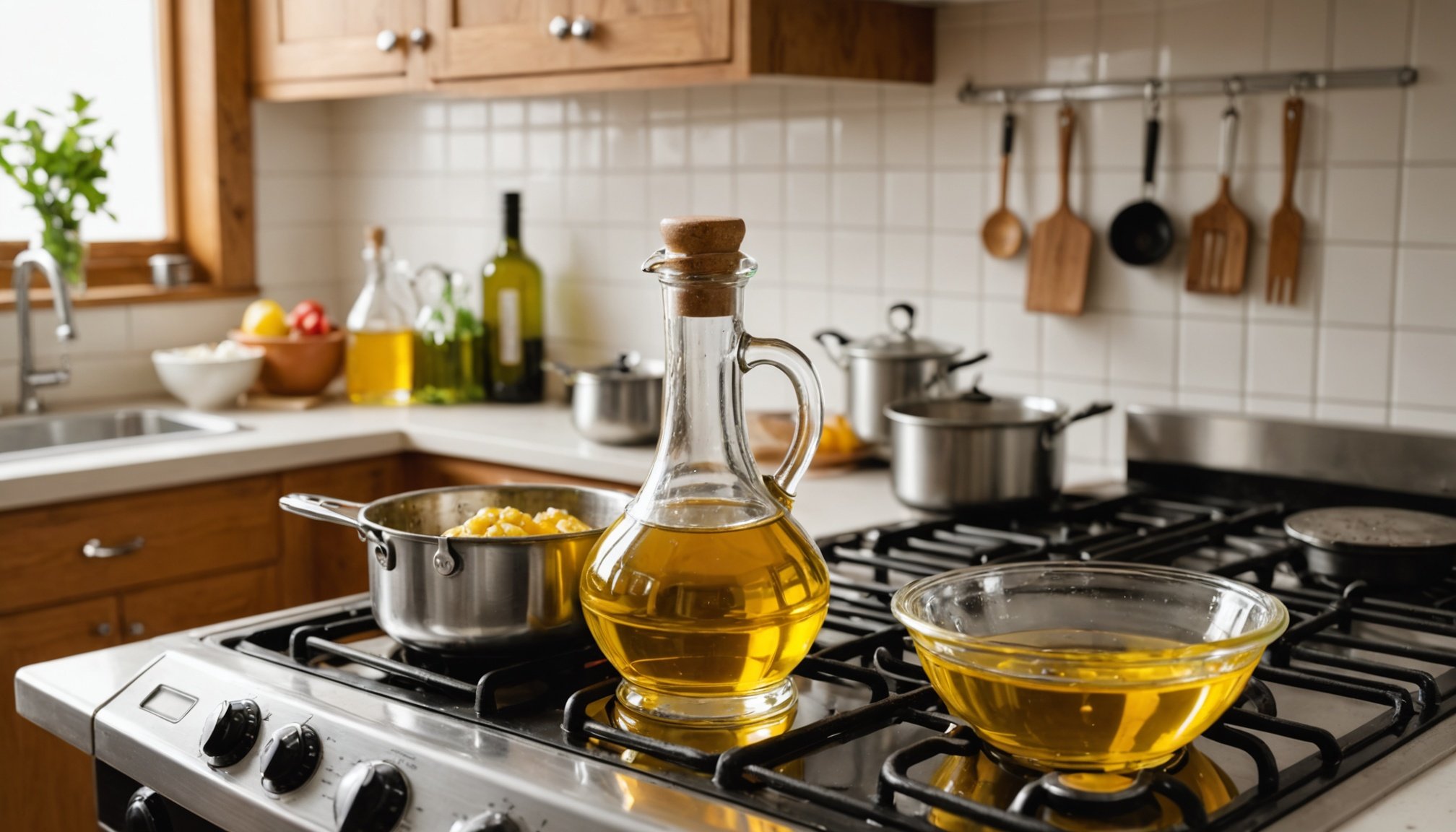Understanding the Importance of Proper Cooking Oil Disposal
Handling cooking oil disposal properly is crucial for both environmental and health reasons. Improper disposal can lead to severe environmental impacts. When cooking oil is poured down drains, it can cause blockages in sewer systems, leading to potentially expensive damage and pollution. Additionally, incorrect disposal contributes to the formation of fatbergs, large masses of oil and non-biodegradable materials that require costly removal.
The health concerns associated with reusing or improperly storing cooking oil are significant. Using oil multiple times can degrade its quality, introducing harmful compounds, and altering its flavour. These degraded compounds can contribute to various health issues, including increasing the risk of diseases due to the formation of unhealthy trans fats and toxins when oil is repeatedly heated.
En parallèle : Maximize Energy Savings: Essential Tips for UK Homeowners to Perfectly Set Their Smart Thermostat
In the UK, legislation mandates proper disposal to minimize adverse effects on both health and the environment. Regulations require establishments to dispose of oil through licensed waste management companies. Non-compliance can result in fines or sanctions, emphasizing the importance of adhering to these guidelines. By following these practices, we can mitigate negative environmental impacts and protect our health and infrastructure.
Safe Storage of Used Cooking Oil
Storing used cooking oil correctly ensures its quality for potential reuse, while also preventing waste. The choice of oil containers is crucial in maintaining quality, as the right ones can significantly prolong the oil’s life. To begin, the container should be made of a non-reactive material such as glass or metal, which helps prevent any chemical interactions that could degrade the oil. It’s also important that these containers have tight-fitting lids to avoid exposure to air, which can accelerate rancidity.
A lire en complément : Key Factors to Consider for Installing a Biomass Boiler in Rural UK Settings
When it comes to storage options, location matters. Ensure the oil is stored in a cool, dark place away from sunlight and heat sources. These elements can break down the oil’s integrity, rendering it unusable.
Key factors in preserving the quality of used oil include filtering it to remove food particles, which can decompose and spoil the oil. Additionally, regularly check for any changes in scent or colour as indicators of spoilage.
For best practices, label containers with the date of storage to monitor freshness, and always strain the oil through a fine sieve or cheesecloth to eliminate potential contaminants before storing.
Reusing Cooking Oil Wisely
Reusing cooking oil can be both economical and environmentally friendly if done wisely. However, not all oil is fit for reuse. It’s crucial to check if the oil has remained clear and free of off-smells. If any burnt residues or particles are present, it may be unsafe to use it again. Tips for safe reuse include filtering the oil after it cools and storing it in a clean, airtight container away from light.
Culinary Applications
Reused cooking oil can be employed in several culinary applications. It’s ideal for dishes that require deep or shallow frying, like stir-fry or sautéed vegetables. Making homemade pastries or fried snacks are also good options for reused oil, as long as the oil’s flavour profile complements the dish.
Addressing Risks
The primary risk involved in reusing cooking oil is the development of harmful substances due to overheating. To mitigate risks, never exceed the smoke point of the oil, and be vigilant for any changes in its color or consistency. Additionally, avoid mixing oils as different types have unique smoke points. Following these guidelines helps ensure safe, effective reuse of cooking oil in the kitchen.
Eco-Friendly Disposal Methods
Recycling kitchen waste is an essential step in maintaining a sustainable household. Understanding the local recycling options for used cooking oil in the UK can significantly contribute to this effort. Proper disposal ensures adherence to local regulations, protects the environment, and can even produce useful byproducts.
In the UK, kitchen recycling of used cooking oil is facilitated by numerous disposal options. Many local councils offer collection services specifically for cooking oil, turning waste into biofuel. It’s crucial to follow the provided guidelines, which often require oils to be stored in sealed containers.
To engage in environmentally responsible disposal, householders should start by identifying collection points or facilities that accept used cooking oil. These local recycling options are designed to handle kitchen waste safely and efficiently. Many retail stores and supermarkets also have dedicated oil collection bins.
Compliance with local regulations is a key element. UK laws stipulate the correct disposal methods to prevent blockages and environmental contamination. Householders are encouraged to consult their local council’s website or contact them directly for precise guidelines on disposal methods, ensuring all steps are aligned with environmental policies.
Addressing Health and Safety Concerns
Navigating the disposal of used cooking oil can seem daunting. However, adhering to health regulations ensures both environmental safety and compliance. Health regulations mandate proper disposal to prevent contamination and environmental hazards. Recognising used cooking oil as hazardous waste under certain conditions can guide you in identifying appropriate disposal methods.
Safety guidelines are pivotal in maintaining safe kitchen practices. When handling cooking oil, allow it to cool completely before disposal. Hot oil poses a burn risk and can damage waste systems. Dispose of in designated containers, ensuring hazardous waste is kept separate to avoid contamination.
The correct identification and handling of hazardous waste help maintain health and environmental safety. Some oils, due to additives or contamination, classify as hazardous, heightening the necessity for proper procedures. Following these guidelines not only complies with health regulations but also supports sustainable practices.
Adhering to these guidelines positively impacts health and environmental safety, encouraging peace of mind. Through safety guidelines, it becomes simpler to dispose of used cooking oil correctly, ensuring compliance with health regulations and minimizing potential risks associated with improper disposal practices.
Resources for Responsible Cooking Oil Management
Navigating the world of responsible cooking oil disposal can feel daunting without the right guidance. Thankfully, there are numerous local resources that can make this journey easier.
Local governments often provide detailed guidelines to help residents identify suitable cooking oil recycling centers. These centers not only offer convenient drop-off locations but also ensure the oil is processed correctly. A quick search on your municipality’s website will likely yield a list of resources directing you to nearby facilities.
Additionally, several organizations produce educational material to inform the public about proper cooking oil management practices. These materials often underscore the importance of reusing cooking oil when possible, and the environmental impact of improper disposal.
Engage with your community through local programs and workshops. Many areas host events focused on safe cooking oil disposal, providing hands-on opportunities to learn and practice responsible management. These community programs not only raise awareness but also foster a sense of collective responsibility towards the environment.
By leveraging these resources, you can contribute to a cleaner and more sustainable world, ensuring that your cooking oil disposal is both ethical and effective.











